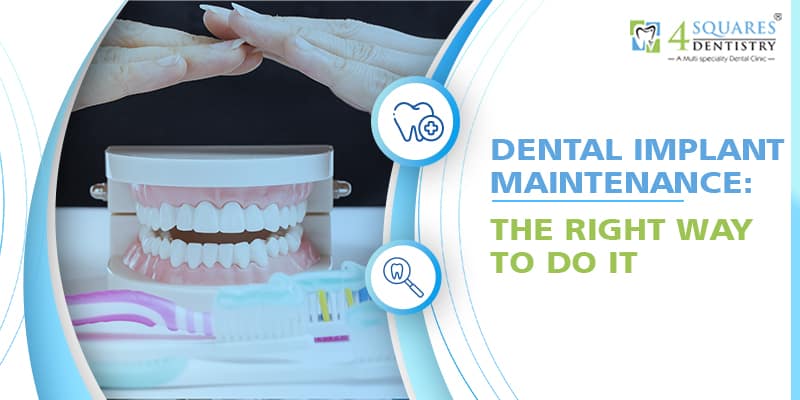Dental implants are by far the best available solution for restoring lost or damaged teeth. If you've had an implant, you will be well-aware of the money you've invested in it. Dental implants are not a "fix-it-and-forget-it" solution. They require the right care and attention, as with any restoration. The right maintenance can prolong the lifetime of your implants and ensure the most return on investment.
Our blog lists down four crucial practices you must follow to ensure that your implants are functioning properly. But before that, let's take a quick look at the types of implants commonly used in every dental hospital in Chennai.
Dental Implants And Their Types
Most dental implants are metallic fixtures surgically drilled into the jawbone located below the gums. The artificial teeth are fastened onto these implants to give a natural look, feel, and function.
Two types of implants are widely used in dentistry.
- Single-tooth implant: As its name suggests, the single tooth implant replaces a single broken or lost tooth.
- Overdentures: Overdentures are removable dental prostheses. They are supported by dental implants and held in place by the tissues in the mouth.
Whether it is a permanent or a temporary dental implant, they require adequate care, just like your natural teeth. You can consult your nearest dentist in Gowrivakkam to know the best practices to protect your implants from tartar buildup, plaque, and decay.
Also Read: About Changing your teeth and your smile for the better
4 Best Practices To Protect & Maintain Your Dental Implants
1. Brushing
Brushing is a basic dental hygiene habit. However, if you've had a single implant, you need to take extra care. We recommend using a soft-bristled toothbrush and a non-abrasive toothpaste to brush twice a day or after every meal. Take care to brush the restoration, the crown, the underside, and remaining natural teeth. Using non-abrasive toothpaste will protect the restoration. We also recommend using a nylon-coated interdental brush to clean hard-to-reach places in your mouth.
2. Flossing
Flossing an implant tooth requires a special technique. You need to use an oral or a dental water irrigator. This type of water flosser can flush out food particles and kill bacteria located 6mm in depth. Water flossers are far better than dental flossers as they can effectively flush out deeply embedded food particles that can likely cause Peri-Implantitis. Crowns and bridge floss is designed with two rigid nylon ends and a soft, fluffy centre. This uniquely designed floss helps gently clean the porcelain and then the rigid nylon ends can clean in between the implants. Thus, the fluoride spreads all over the implants and prevents bacterial growth.
3. Inspection
Your dental implant will have miniature components like O-rings, clips, and locator caps to hold the implant in place. You should give these a close inspection every single day to ensure they are intact and free of food particles and signs of decay.
4. Maintenance
Soak your implant-supported dentures in the dentist-recommended cleaning solution for the required time. Gently brush the undersides with a denture brush to remove plaque, dirt, and food particles. Remember to replace the hardware under the denture when your dentist recommends a replacement.
A Little Care Goes A Long Way
There is no better option than dental implants to restore your lost teeth. Although they are expensive and require a lot of care, dental implants are the best replacement for your natural teeth. As long as they are maintained properly, dental implants are well worth the effort and expense.
At our dental hospital in Medavakkam, we can help you choose the perfect dental implant and guide you with the right maintenance procedures and practices. Please book your appointment and visit us today!
